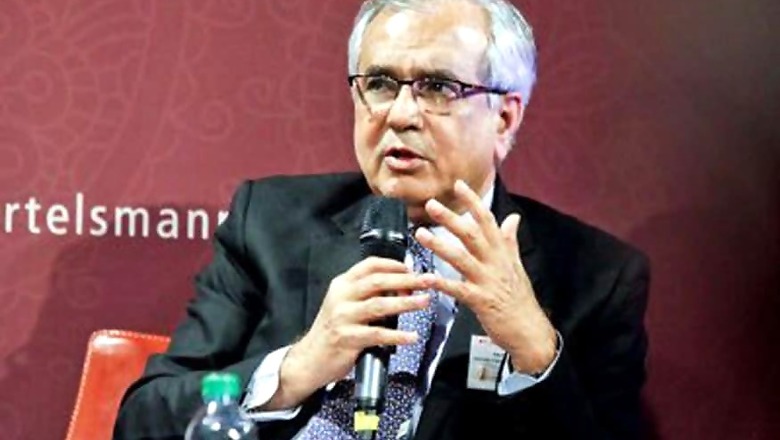
views
New Delhi: Rajiv Kumar, the newly appointed Vice Chairman of the NITI Aayog, declared in his first press briefing that he wouldn't take any questions on demonetisation, but was eventually forced to relent because journalists wanted to know if it was responsible for the fall in economic growth.
"No questions on demonetisation," Kumar said during the media briefing at the NITI Aayog on his first day in office. But when the first question sought to know if the fall in economic growth was due to scrapping high value notes, he said, "Demonetisation is not the cause because the impact was primarily for six weeks from November to January."
Kumar said that the economic growth figures for the April-June quarter which were released on Thursday were a blip and that growth would edge back up to 7%-7.5% in the second quarter (July-September).
Rajiv Kumar’s robust defense of the note ban comes amid criticism from various quarters about the impact of the move on the economy, particularly slowing growth. Data released by the RBI two days ago showed that almost 99% of scrapped bank notes made their way back into the system. GDP data released on Thursday showed that growth had slipped to its lowest in three years, which some economists are attributing to the combined effects of demonetisation and the implementation of GST.
Kumar's tenure started after the previous VC, Arvind Panagariya, abruptly resigned last month saying that he could not extend his sabbatical at Columbia University.
Kumar has also authored several books and articles on Prime Minister Narendra Modi and the BJP. A professional economist, Kumar has had stints in academia, think tanks, industry bodies and government. He was a fellow with the Centre for Policy Research and served as chief executive of the Indian Council for Research on International Economic Relations (ICRIER). Kumar was also the vice-chancellor of the Gokhale Institute of Economics and Politics in Pune.
He served as the secretary general of the Federation of Indian Chambers of Commerce and Industry (FICCI) and chief economist of the Confederation of Indian Industries (CII), as well as in positions with the Asian Development Bank, the Indian Ministry of Industries, and the Ministry of Finance.
In today's briefing, Kumar said that the primary focus areas of the NITI Aayog would be to prepare a roadmap to create jobs and employment opportunities, kick start the investment cycle, transform agriculture and concentrate on health and education. The NITI Aayog would work closely with the states in order to implement these policies.
However, the government think tank is facing criticism from several quarters. Some organizations like the Swadeshi Jagran Manch claim that it has become a hotbed of vested interests. In fact, the SJM's position is that NITI Aayog is pushing corporate interests and deviating from the Prime Minister's agenda.
In the briefing, Kumar spoke extensively in Hindi, apart from English, which was welcomed by several journalists from the vernacular media as an indication that the new VC would give them equal space. A criticism of the NITI, its predecessor the Planning Commission and several economists who hold official positions in the government, has been that they are foreign educated and live and work mostly in the West, and are thus insufficiently knowledgeable about India or its economy. This was a criticism aimed at Arvind Panagariya, Raghuram Rajan and even Montek Singh Ahluwalia.
In fact, shortly after Rajiv Kumar was appointed to the NITI Aayog he wrote a column in Dainik Jagran in which he described his vision of a swadeshi patriot-technocrat, as per a report in Scroll.in. In the article, Kumar lamented the "Anglo-American" influence on Indian policy making. He gave examples of Raghuram Rajan and even his own predecessor Arvind Panagariya, claiming that these kinds of people had several failings. They do not understand the Indian ground realities and are not committed enough, so tend to run away from responsibilities before their tenures end. Besides, he claimed, the policies they frame spring from their ideological baggage rather than any real need.
In today's briefing, Rajiv Kumar said he was still coming up to speed with his new role. He and the Aayog will have to firefight on several fronts to successfully steer the Aayog through choppy waters.


















Comments
0 comment